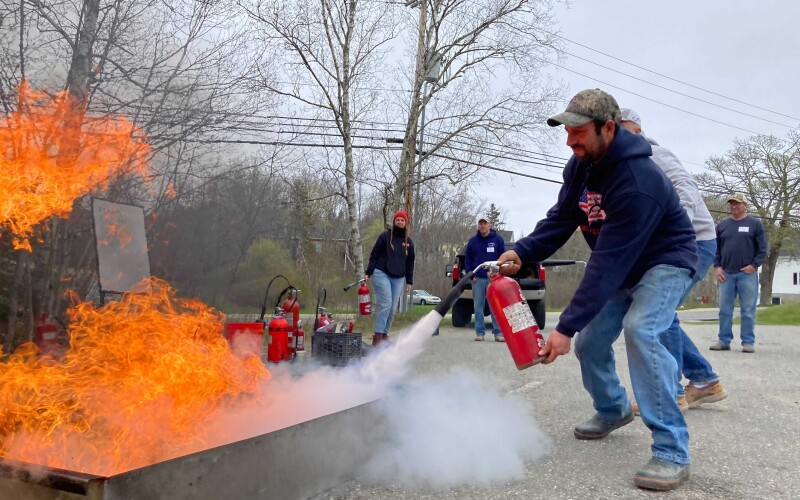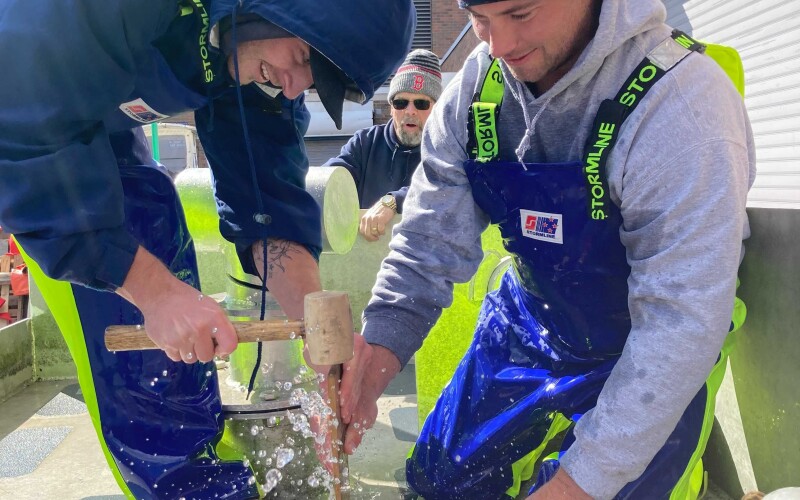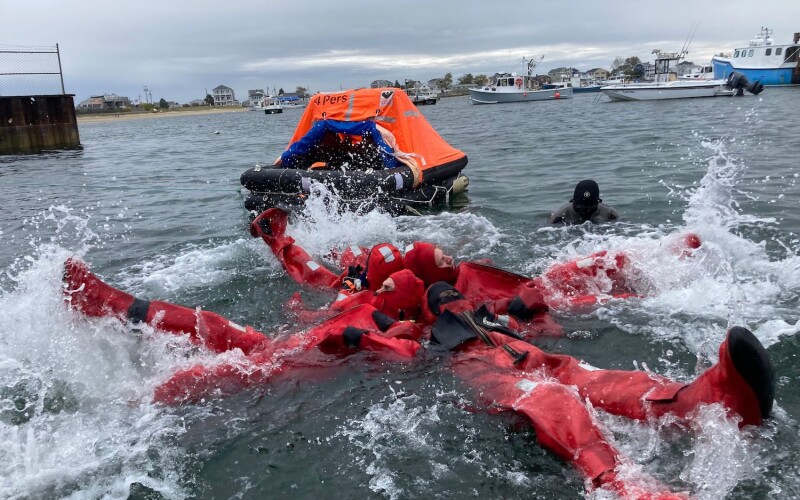FISH Wellness Act can advance safety training and fishermen’s health programs
In fishing families and communities across the country, respect for the ocean is a lesson handed down from one generation to the next. Safety training is becoming part of that tradition.
“Fishing communities are close-knit by nature,” said Emily Coffin, Seafood and Fisheries Policy coordinator for the Maine Coast Fishermen’s Association. “When tragedy strikes, all members are personally affected by loss. Safety training does more than save one or two lives; it can keep communities whole.”
These days, Emily supplements her hours on the water with her work at the association, learning more about the legal and regulatory systems impacting her family’s tradition of fishing, including the programs that support fishermen’s safety training.
“Before I earned my commercial license, my dad took me to a daylong safety training at our local community center,” said Coffin, whose father is a career lobsterman. “I donned a safety suit, became versed in fire safety, and earned a newfound sense of safety on the water for both my dad and me.”
Every injury or loss of life at sea is a tragedy. Safety training programs across the country have reduced commercial fishing vessel injuries and fatalities by nearly 80 percent since the National Institute for Occupational Safety and Health began a grant program to help fund research and development for safety training.
Now, a new fishing-focused and industry-led safety and wellness bill in Congress presents an opportunity to expand access and the coverage of those programs by taking a holistic approach to fishermen’s health, both physical and mental. It would also eliminate a required 25 percent funding match that has often been passed on as an expense to commercial fishermen or their trade organizations participating in safety training.
The Fishing Industry Safety Health and Wellness (FISH Wellness) Act, introduced by Senators Ed Markey (D-Mass.), Dan Sullivan (R-Alaska), Susan Collins (R-Maine), Jeff Merkley (D-Ore.), Lisa Murkowski (R-Alaska), Jeanne Shaheen (D-New Hampshire), and Roger Wicker (R-Miss.), proposes to put commercial fishing safety training on an even fiscal playing field with other programs of its type across industries served by the National Institutes for Occupational Safety and Health.
“Industry-informed improvements to fishing vessel safety training, requirements and equipment have saved countless lives in small-boat, community-based fisheries throughout New England,” said Aubrey Church, policy director for the Cape Cod Commercial Fishermen’s Alliance. “Expanding access to funding for health and safety programs will not only help the fishermen we know and support today, but also help create community-based safety nets for the young fishermen of tomorrow.”
This legislation would expand and modernize the Fishing Safety Research and Training Grant Program in order to make it more accessible and explicitly include behavioral wellness as a component of fishermen’s health and safety. That inclusion opens the door to a wider array of funded training opportunities and research into other areas of worker health and wellness — both mental and physical — which are specific to fisheries.
The bill is industry-informed with the help of Massachusetts-based Fishing Partnership Support Services, Maine Coast Fishermen’s Association and the Cape Cod Commercial Fishermen’s Alliance. Other proponents include members of the national Fishing Communities Coalition, which represents community-based commercial fishing industry organizations from across the country.

“Our Fishermen First Aid class is so popular that we’ve had to turn people away,” said J.J. Bartlett, president of Fishing Partnership Support Services, which has trained more than 2,200 fishermen from Jonesport, Maine, to Wanchese, N.C. since this funding became available five years ago. “There’s a demand from the fleet for relevant, hands-on training. They don’t want to just check a box for a requirement. They want to learn skills that make them better fishermen. We can help meet that growing demand by removing the match requirement.”
Meeting fishermen where they are is another priority for the Fishing Partnership mission.
“The fishing community is leading this effort,” Bartlett said. “Funding allows us to work with fishing communities to bring the training to their homeport. It is hard enough to run a fishing vessel. Traveling eight hours for training is a big burden. It has to be accessible. We’ve been using this funding to work with the fishing communities to bring the training to them. We’ve been to over 30 ports since this started.”
The Maine Coast Fishermen’s Association is a longtime leader in fishermen’s health initiatives, most of which are encompassed by its broad-reaching Fishermen Wellness Program. The program advocates for more resources to support the mental health and well-being of commercial fishermen, and partners with organizations to create opportunities for fishermen to find help and information.
“Commercial fishermen are industrial athletes whose work takes a toll on both physical and mental health, and we are pleased to see health and wellness included in these critical programs,” said Monique Coombs, Maine Coast Fishermen's Association’s director of Community Programs. “This bill humanizes the work that fishermen do. Expanding access to physical and mental health support and training provides sustenance for our community fisheries and helps sustain the domestic seafood supply. We thank Senator Markey and Senator Collins for their outstanding support for our fishing communities’ wellbeing.
As it stands, NIOSH’s grant-funding program requires organizations that apply for commercial fishing safety training to match 25 percent of the federal grant funds. One way organizations match those funds is to charge a fee for the commercial fishermen who take the training.
However, the grant match is not a requirement for other programs that fall under this same funding umbrella at NIOSH.
Eliminating the co-share requirement will help lower — and in some cases eliminate — the cost to commercial fishermen that training organizations often have to pass onto them. Co-share requirements act as a barrier to training for fishermen from economically struggling fisheries, entry-level crew or any crew members who might benefit from the training but may not have the cash on hand.
“Adequate safety training protects all crew members, and as such should be equally accessible to all crew members — regardless of the fishery or the economic status of the fisherman,” said Leann Fay Cyr, executive director of the Alaska Marine Safety Education Association, which facilitates training programs nationwide.
Most commercial fishermen are not employees. Therefore, they are not covered and protected by worker’s comp or the usual OSHA requirements for workplace safety. Many fishing fleets have also been affected disproportionately by the effects of the pandemic, fishery stock declines and other negative climatic and economic events.
Add to these factors the natural risks of working in a volatile outdoor environment, on a vessel platform that is pitching and rolling, and on trips that can last for weeks or months. The work of commercial fishing has physical, emotional and mental health challenges that far exceed the demands of most other workplaces.
“This legislation and appropriation would go a long way to continue and expand the work the Coast Guard and NIOSH have done so far — which has decreased the industry’s fatality rate by more than 75 percent — by also addressing the high risk of injury, workplace wellness and mental health issues unique to this work sector,” said Jerry Dzugan, who now serves as a key trainer for AMSEA after stepping down from 36 years as the executive director.
These challenges are in turn shouldered by entire fishing communities whose economic, cultural and emotional health depend on workers who provide one of the largest sources of free-range, healthy, nutrient-dense foods — as well as an important component of domestic food security.
“Fishermen’s health and wellness are critical but often overlooked aspects of functional and vibrant coastal communities,” said Theresa Peterson, the Alaska Marine Conservation Council's fisheries policy director. “We applaud an expansion of the nation’s most successful fishermen's safety programs and bringing their funding opportunities in line with other CDC-funded health and safety grants.”
Dzugan was a co-author on a study addressing opioid overdoses in the commercial fishing industry. Suicides and drug overdoses have become an increasingly large share of onboard fatalities in the commercial fishing industry.
The study, which included input from 61 commercial fishing captains, examined naloxone training and availability, and the level of concern over substance use in commercial fishing.
Of those 61, 10 had naloxone training, but only five boats were equipped with naloxone.
A NIOSH publication that tracks the leading causes of fatalities in commercial fishing has documented the high rate of deaths from overdoses and other clearly linked mental-health-related fatalities. In Alaska, for example, onboard fatalities were mostly the result of overdose and suicide.
Workers in physically demanding jobs with high injury rates, long hours, productivity pressures, and lack of job security are at higher risk for substance use and misuse, AMSEA’s Fay Cyr notes. An updated program will better protect this segment of critical domestic workers.
“The Alaska Marine Safety Education Association worked to save fishermen’s lives by empowering them with hands-on, data-informed training programs thanks to the funding it receives from this essential program,” said Linda Behnken, executive director of the Alaska Longline Fishermen's Association. “Expanding this program to help fishermen understand and mitigate a wider range of professional health and safety risks will not only continue to save lives but also improve them. We thank Senators Markey and Murkowski for their continued leadership supporting their coastal community constituents by introducing this bill.”

As advocates for commercial fishermen around the country and specifically for Alaska’s sector, AMSEA staff note that this amendment would increase protection of the health and safety of commercial fish workers, who make up the largest sector of Alaska’s employment and suffer one of the highest risk occupations in the country.
Though Alaska is often considered the center of our domestic commercial fishing industry as the provider of more than half the nation’s wild catch, the need for training is widespread — especially in places with little industry funding and trade organizations stretched thin by other pressing industry needs like negotiating for working waterfront access and representing fishing fleets in offshore wind development efforts.
“Commercial fishermen throughout the Gulf of Mexico benefit from fleet-specific training and safety programs funded through the CDC, and this bill will only enhance these critical and lifesaving efforts,” said Eric Brazer, Deputy Director at the Gulf of Mexico Reef Fish Shareholders’ Alliance.
“Our fishermen are facing unprecedented competition, from declining stocks to loss of access to working waterfronts, to reduced prices due to seafood imports, exacerbating the physical and mental toll of the day-to-day work from deck to dock," said Brazer. "Expanding this program is an investment in quality of life for our seafood harvesters, which is needed now more than ever. We applaud Senator Markey and Senator Wicker for their support of lifesaving fishermen's safety training.”
As fishing and training organizations praise the bill’s sponsors and continue to reach out to other members of Congress to encourage them to vote in support of these changes, they remind us all that they have a good story to tell about the culture of safety in the industry. This expansion would only help to grow that success and help improve quality of life in commercial fishing communities.
“Commercial fishing safety training has played an important role in reducing fatalities and changing the culture of safety in fishing,” said Fay Cyr. “Since this program began, commercial fishing fatalities in the U.S. have been reduced by more than 75 percent. That is a tremendous success rate we hope legislators will continue to support.”
Jessica Hathaway is a senior fisheries and seafood policy consultant for Ocean Strategies, a fisheries-first public affairs firm. She is based in Portland, Maine.






